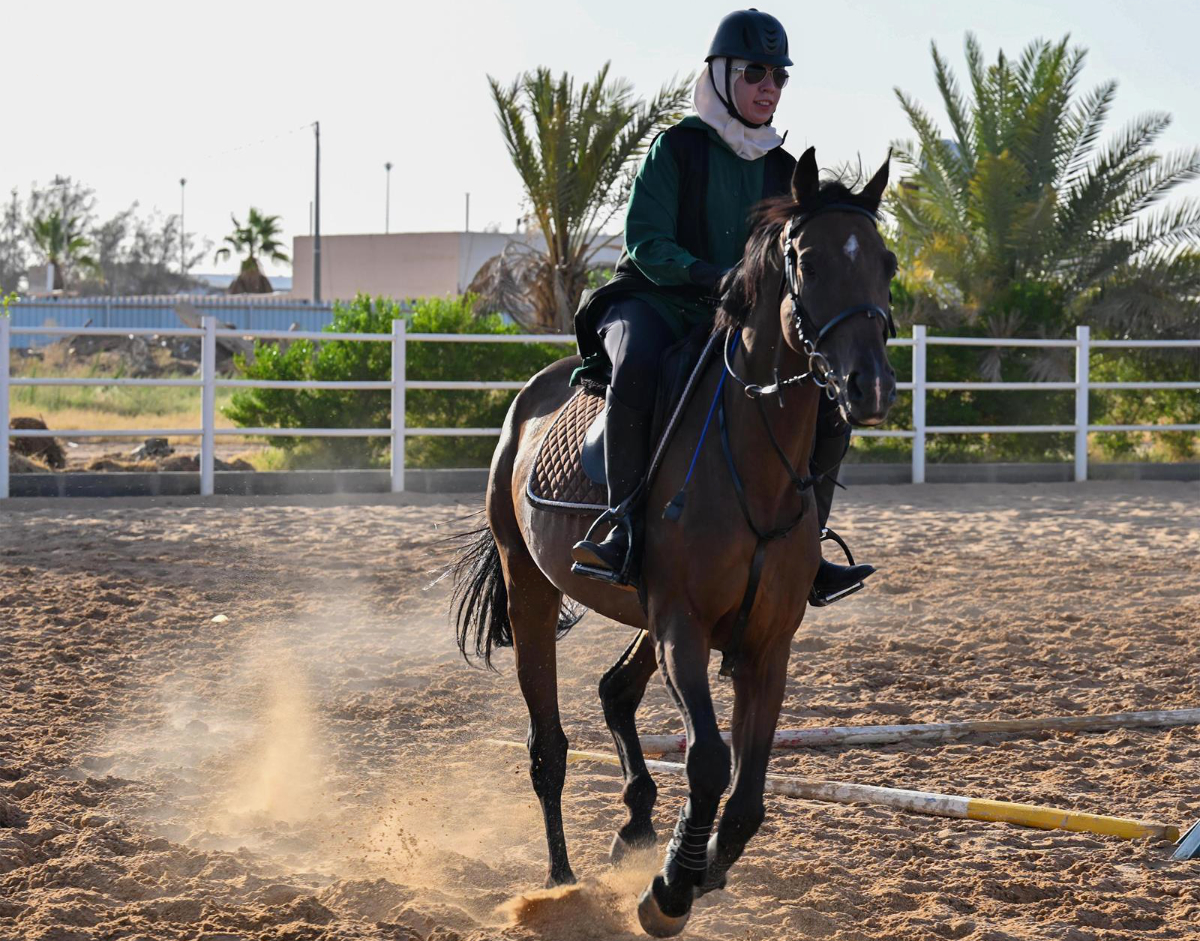RIYADH: With the resurgence of equestrian sports in the Kingdom, Saudi women in Tabuk are reconnecting with their heritage and taking the reins with skill and passion.
In a recent interview, equestrian Arwa Al-Talbi spoke to the Saudi Press Agency about the beginnings of her journey into the world of horses.
“My relationship with horses began five years ago when I read about the psychological philosophy of equestrianism, which inspired me to learn to ride,” Al-Talbi said

Saudi Vision 2030 has ushered in a new era for women’s sports, enabling them to pursue various sports, with equestrianism a standout. (SPA)
She said that equestrianism is not just a physical activity, and that there is a spiritual and mental connection inherent in one of the oldest sports known to humanity.
“My journey into the world of horses started thanks to God and the wise leadership’s support for equestrianism and the empowerment of women in various sports,” Al-Talbi added. Her love for horses and skill as a horse rider has led to her becoming an accomplished show jumper and free rider.
She is learning the sport of tent pegging, which is a “test of a rider’s skills due to its historical ties to ancient warfare.”
FASTFACTS
• The Tabuk region is currently hosting a foundation training course for the sport of preliminary tent pegging, organized by the Saudi Equestrian Federation.
• The 15-day course, held at the Al-Thunayanh stable, has attracted about 30 riders of various ages, both male and female.
Al-Talbi is encouraging more women to embrace equestrianism, highlighting benefits that extend beyond physical health and enhance psychological and mental well-being.
Another female rider, Ohoud Al-Majzoub, said her deep connection with horses is rooted in her pride in her Arab identity and a lifelong passion that began in childhood. She followed her dream of becoming an equestrian by training to acquire all the necessary skills.
Now she excels not only in free riding but also in show jumping, a discipline that demands navigating a series of obstacles, from simple vertical heights to intricate courses. Her journey is testament to her unique and distinctive sporting creativity.
In the SPA report, equestrians Raghad Mahmoud and Heba Al-Fares said that their childhood dreams of horse riding were once just hopes, because of the lack of clubs. However, Saudi Vision 2030 has ushered in a new era for women’s sports, enabling them to pursue various sports, with equestrianism a standout.
They have since learned to ride and excel in show jumping and free riding and said the availability of such sports and the establishment of dedicated clubs will ignite the passion of many women, whether in equestrianism or other sports.
Noting the growing interest in equestrian sports among women in the Tabuk region, Nasser Al-Nasser, who owns stables in the area, confirmed to SPA that there is a year-round increase in demand for the sport.
Women’s interest in the sport led him to open a special track for women with a focus on show jumping and with female trainers on hand. He added that, despite its long history in the region, equestrianism is now seen as a modern sport that has captivated young men and women alike. In Saudi culture, he said, it symbolizes courage, pride, beauty, strength, heroism and authenticity.
The sport also enhances self-confidence, teaches patience and endurance, and provides numerous psychological and physical benefits to its enthusiasts, he added.
The Tabuk region is currently hosting a foundation training course for the sport of preliminary tent pegging, organized by the Saudi Equestrian Federation. The 15-day course, held at the Al-Thunayanh stable, has attracted about 30 riders of various ages, both male and female.
The training course aims to promote the sport in Saudi society and encourage its practice among horse riding enthusiasts regardless of gender, the SPA said in its report.
The course includes a theoretical part that educates participants on the key regulations and laws of tent pegging. The practical part focuses on training techniques and skills in using spears and swords in various approved competitions.
Participants who complete the training will be awarded certificates by the federation in collaboration with the Leaders Development Institute.




























